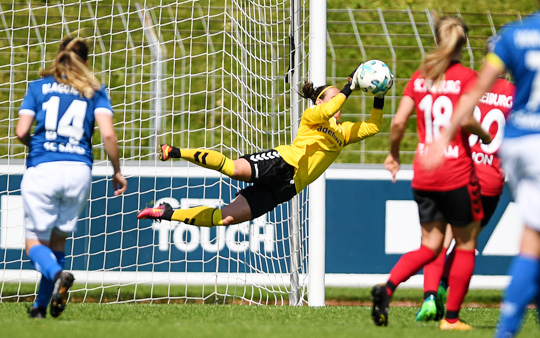Kicking against clichés
Freiburg, Jul 03, 2018
Technique, athletic facilities, speed: Women’s soccer has become highly professionalized, says Nina Degele, a professor at the Institute of Sociology at the University of Freiburg. However, Degele still sees the equal treatment of women’s soccer in a man’s sport to be a distant prospect - and that also applies to tennis, track and skiing. Mathias Heybrock talked with the researcher about why women and men are treated differently in sports, why women seem to be reluctant to engage in competitive sports and which countries are more progressive in terms of gender than Germany.

Nurture, not nature: During her research project, Nina Degele discovered that women players are called out more often in competitive sports, leading women to attack a lot less. Photo: Patrick Seeger
Ms. Degele, the World Cup is in full swing. The men’s World Cup, that is.
Nina Degele: You don’t need to clarify. The word “World Cup” is enough. The women’s World Cup is treated more as an aberration that always seems to have to be emphasized. And that says pretty much everything.
What does it say?
That soccer, our nation’s number one sport, ostracizes women, which harks back to the beginning of the 19th century. Football was very homosocial - tailored to a single group, namely men. It also contributed to a sense of “defensibility”. Later the German Football Association (DFB) went so far as to forbid women to play. That was in 1955.
For what reason?
Because it was said that the women players would “lose their feminine elegance” and “their bodies and souls would suffer harm.” It was interesting timing: The ban occurred one year after Germany first won the World Championship. No sooner had the men’s war stigma been lifted, the women were called back to the kitchen. The soccer ban didn’t end for women until 1970. Such prohibitions applied to other sports too. For instance, the US athlete Kathrine Switzer illegally ran the Boston marathon in 1967. It was said women runners ran the risk of losing their uteruses. Women ski jumpers had to listen to such nonsense for a lot longer even.
But today we watch women in track and field just as much as we do men.
That is true. The same applies to tennis and skiing – even though women are paid less. They still don’t fully belong. The sports world still calls it a “decathlon” for men today. Women only compete in seven disciplines.
Because they don’t have the same capabilities?
Then the marathon would also have to be a different distance for both genders. That's paradoxical. Take the biathlon for instance: women run shorter distances, but then shoot just like men do. Same distance, same conditions. Why? In my eyes, it’s all about wanting to make a distinction by not treating women and men alike. And in soccer that won’t change for a long time in Germany.
How is it in other countries?
In the United States women’s soccer is a very popular and integrated sport, especially at the college level. Men have to fight harder there because soccer is considered to be a “girly”. Nevertheless, the men players in the US national team earn a lot more than the US women even though the men are less successful and participate in fewer finals. In Norway women and men on the national soccer teams earn the same. The men acted in solidarity when the women complained. The same goes for Denmark.
How come it works there and not here?
It is a different, more advanced culture in terms of gender. And soccer does not have nearly the same meaning there as it does in Germany. Their teams have not been four-time world champions and are therefore not as dominant.

Corrupt, commercialized and overbred: Nina Degele thinks it highly unlikely that men’s soccer will change much in the next 50 years in Germany. Photo: Ingeborg F. Lehmann
But women’s soccer has developed in Germany too, right?
Yes and no. There is more tolerance and yes, the DFB has made some advances. I think back to 2011 when the women’s World Cup was in our own country and the efforts to make the tournament a “summer fairytale” and an attractive event. But for the women players it is a double-edged sword. Soccer should be an attractive sport – with attractive women. But that also puts the pressure on to prove that soccer and being a woman are somehow compatible. Several DFB junior leaguers even posed in the nude for Playboy magazine to prove that the old image of the combative dyke was passé. Men don’t have that problem. They just aren’t allowed to be homosexual.
Is homosexuality not such a taboo subject for women?
No, being a woman while playing soccer is contradiction enough. It doesn’t add any more fuel to the fire if a player is a lesbian.
How do you view women’s soccer from a purely athletic perspective?
In terms of technique, athletic facilities and speed, it has become much more professional. However, it is still said that women don’t engage in competitive sports. I don’t think the cause is nature, but nurture. It is a learned behavior.
What do you mean by that?
Several years ago as part of a scientific investigation, I conducted interviews with women amateur soccer players. They said that every aggressive play would be called. Male and female referees tend to call those plays more or less unconsciously. And the players do not attack as hard any more, otherwise they fly out of the game.
Women’s soccer is slower than men’s soccer. Is that a correct assessment?
Indeed. But speed is relative. On average men run faster during a 100-meter run than women do. If you then watch a women’s game, you don’t have the direct comparison. So you don’t even notice.
Men’s soccer is in a crisis. Can you say “commercialization”?
Unfortunately, I cannot see a crisis with potential for change. I only see business as usual: Corruption, doping, authoritarian regimes as World Cup hosts. Starting in 2026 the World Cup will be held for the first time with 48 instead of 32 teams. There is still more money to be made.
In the event a crisis does emerge: would women’s soccer be the more honest alternative?
That would be nice, but at the moment most unlikely. I’m afraid Germany will stick to the old for another 40 or 50 years.
And if you could make a wish?
Then I would wish for equal appreciation and payment for both female and male pros in Germany.
Have you ever played soccer yourself?
I used to play as a kid. I thought FFC Frankfurt was great, back then when Birgit Prinz was playing. Every now and again I will go to see the SC women’s team in Freiburg, but not to the men’s team. I don’t want to support the men’s overbred national league.

